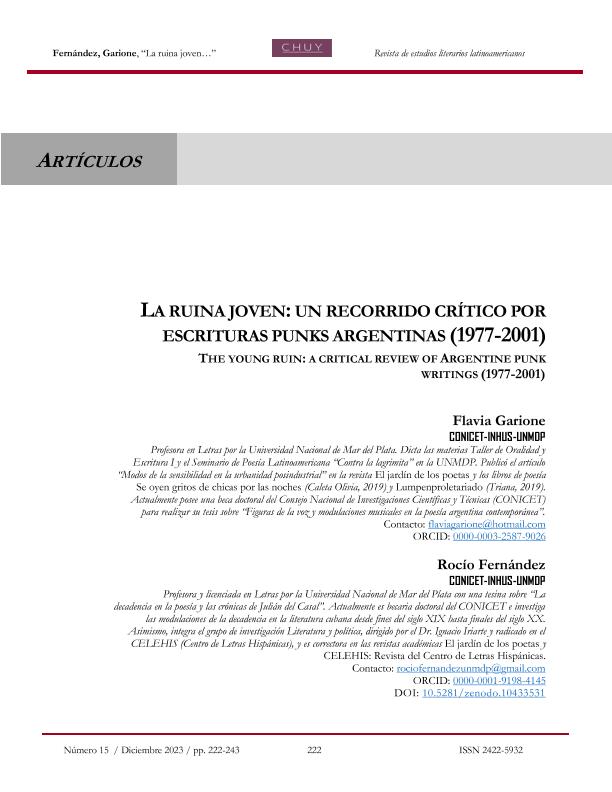Mostrar el registro sencillo del ítem
dc.contributor.author
Garione, Flavia Vanesa

dc.contributor.author
Fernández, Rocío

dc.date.available
2024-03-19T12:43:35Z
dc.date.issued
2023-12
dc.identifier.citation
Garione, Flavia Vanesa; Fernández, Rocío; La ruina joven: un recorrido crítico por escrituras punks argentinas (1977-2001); Universidad Nacional de Tres de Febrero; Chuy. Revista de estudios literarios latinoamericanos; 10; 15; 12-2023; 222-243
dc.identifier.uri
http://hdl.handle.net/11336/230900
dc.description.abstract
Entre 1977 y 1978, el Jubileo de Plata de la Reina Isabel II se constituye en escenario de dos hechos artísticos: la puesta en escena de “God save the Queen” en el Támesis y el estreno de Jubilee de Derek Jarman, la primera película punk. Tanto la línea “There is no future in England's dreaming” de la canción, como el horror que invade a la Reina Isabel I en el film cuando viaja al futuro distópico de los setenta y ve la ruina en la que se ha convertido su imperio, evidencian que en Inglaterra el punk estuvo estrechamente ligado a un sentimiento de decadencia. Por su parte, en 1976, Juan Carlos Kreimer, un joven argentino que escapa de la violencia política, escribe una novela-diario, De ninguna parte, en la que reconstruye la marginalidad y los inicios del punk londinense. Dicha experiencia quedará plasmada, apenas dos años más tarde, en Punk. La muerte joven, especie de manual que intentaba difundir la historia y las estrategias del movimiento punk en nuestro país al mismo tiempo que traducía el deseo de ruina que movía a las juventudes hastiadas del mundo. Teniendo en cuenta el contexto de recepción del libro, este trabajo parte de la pregunta acerca del efecto que tuvo ese deseo de arruinamiento y no futuro del punk durante los ´80 y los ´90 para proponer, a partir de la lectura de los fanzines Resistencia (1984-2001) y Homoxidal (2001-2003), una concepción creadora y políticamente revolucionaria de la destrucción y la escritura.
dc.description.abstract
Between 1977 and 1978, Queen Elizabeth II's Silver Jubilee was the scene of two artistic events: the staging of "God save the Queen" on the Thames and the premiere of Derek Jarman's Jubilee, the first punk film. Both the line "There is no future in England's dreaming" in the song, and the horror that overwhelms Queen Elizabeth I in the film when she travels to the dystopian future of the seventies and sees the ruin her empire has become, show that in England punk was closely linked to a feeling of decadence. For his part, in 1976, Juan Carlos Kreimer, a young Argentine escaping from political violence, writes a novel-diary, De ninguna parte, in which he reconstructs marginality and the beginnings of London punk. This experience will be reflected, just two years later, in Punk. La muerte joven, a kind of manual that tried to spread the history and strategies of the punk movement in our country at the same time that it translated the desire for ruin that moved the jaded youth of the world. Taking into account the context of reception of the book, this work starts from the question about the effect that this desire for ruin and no future of punk had during the '80s and '90s to propose, from the reading of the Resistencia fanzines (1984-2001) and Homoxidal (2001-2003), a creative and politically revolutionary conception of destruction and writing.
dc.format
application/pdf
dc.language.iso
spa
dc.publisher
Universidad Nacional de Tres de Febrero

dc.rights
info:eu-repo/semantics/openAccess
dc.rights.uri
https://creativecommons.org/licenses/by-nc-sa/2.5/ar/
dc.subject
Juan Carlos Kreimer
dc.subject
Resistencia
dc.subject
Homoxidal
dc.subject
Ruina
dc.subject.classification
Literaturas Específicas

dc.subject.classification
Lengua y Literatura

dc.subject.classification
HUMANIDADES

dc.title
La ruina joven: un recorrido crítico por escrituras punks argentinas (1977-2001)
dc.title
The young ruin: A critical review of argentine punk writings (1977-2001)
dc.type
info:eu-repo/semantics/article
dc.type
info:ar-repo/semantics/artículo
dc.type
info:eu-repo/semantics/publishedVersion
dc.date.updated
2024-03-15T14:59:17Z
dc.identifier.eissn
2422-5932
dc.journal.volume
10
dc.journal.number
15
dc.journal.pagination
222-243
dc.journal.pais
Argentina

dc.journal.ciudad
Ciudad Autónoma de Buenos Aires
dc.description.fil
Fil: Garione, Flavia Vanesa. Consejo Nacional de Investigaciones Científicas y Técnicas. Centro Científico Tecnológico Conicet - Mar del Plata. Instituto de Humanidades y Ciencias Sociales. Universidad Nacional de Mar del Plata. Instituto de Humanidades y Ciencias Sociales; Argentina
dc.description.fil
Fil: Fernández, Rocío. Consejo Nacional de Investigaciones Científicas y Técnicas. Centro Científico Tecnológico Conicet - Mar del Plata. Instituto de Humanidades y Ciencias Sociales. Universidad Nacional de Mar del Plata. Instituto de Humanidades y Ciencias Sociales; Argentina
dc.journal.title
Chuy. Revista de estudios literarios latinoamericanos
dc.relation.alternativeid
info:eu-repo/semantics/altIdentifier/url/https://revistas.untref.edu.ar/index.php/chuy/article/view/1887
dc.relation.alternativeid
info:eu-repo/semantics/altIdentifier/url/https://dialnet.unirioja.es/servlet/articulo?codigo=9372576
Archivos asociados
